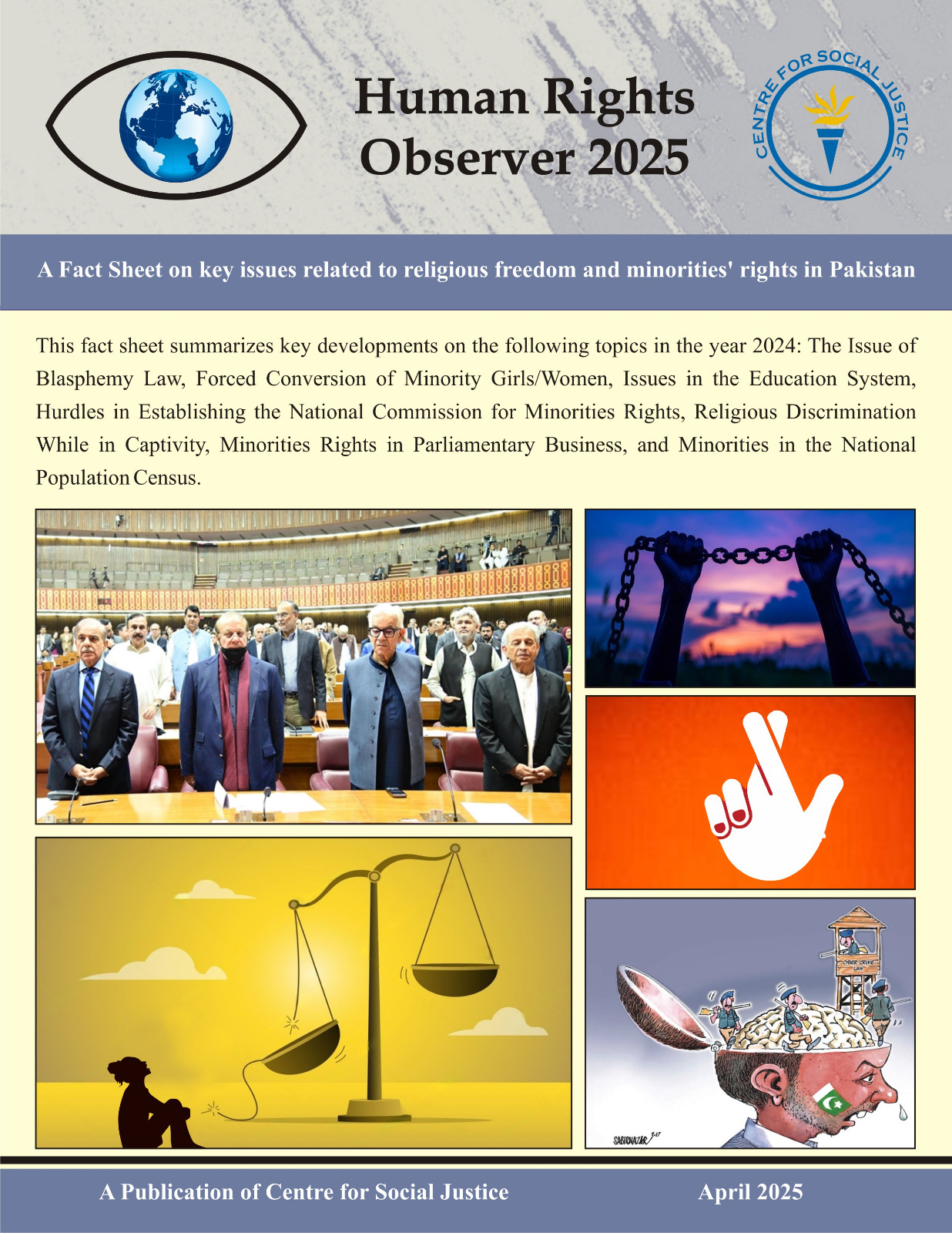Lahore: Centre for Social Justice (CSJ) released its annual Human Rights Observer, underlining the lack of institutional protection for minorities’ rights in Pakistan during 2024.
The report covers the following critical issues, including the misuse of blasphemy laws, forced conversions of minority girls/women, issues in the education system, hurdles in establishing the National Commission for Minorities Rights, discriminatory treatment of minority prisoners, minorities’ rights in parliamentary business, and minorities in the National Population Census. The report also presents practical recommendations to address these issues, besides covering the important developments and incidents throughout the year.
The report recorded 344 new cases in 2024 registered against presumably people who were victimized under blasphemy laws, while 70% of the accused were Muslims, 6% Christians, 9% Hindus, and 14% Ahmadis. The data showed an increased abuse of blasphemy laws, causing widespread harassment and intimidation, particularly for minorities, although the massive abuse was against Muslims.
There was a massive abuse of Section 298-A, with 128 accused; the next most frequently abused provision was Section 295-A, with 106 reported cases. Section 298-C, which is specifically against the Ahmadi community, was also widely misused, with 69 accused. Sections 295-B and 295-C were also extensively used, leading to 62 individuals accused across various regions of Pakistan.
The province of Punjab recorded the highest number of blasphemy-related accusations, accounting for 62% of the total cases. This was followed by Sindh with 30%, Khyber Pakhtunkhwa with 5%, Azad Jammu and Kashmir with 2%, and Gilgit-Baltistan with 1%. Among the districts, the highest number of reported blasphemy incidents occurred in Punjab: Sheikhupura (32), Lahore (28), Kot Addu (13), Rawalpindi (13), Okara (11), Sargodha (11), and Gujranwala (10), Sindh: Tharparkar (35) and Larkana (11) and Khyber Pakhtunkhwa: Mansehra (7) recorded the highest frequency of abuse within the province. In 2024 alone, ten accused were extra-judicially killed by individuals or violent mobs, including six in Punjab (two each in Lahore and Rawalpindi, and one each in Sargodha and Gujrat), two killings in Sindh (one each in Karachi and Umerkot), while one each in Khyber Pakhtunkhwa (Swat), and Balochistan (Quetta) in 2024.
“Among the victims were 282 Hindu girls, 137 Christian girls, and 2 Sikh girls. 71% of the victims were minors, with 22% under the age of 14, and 49% were between the ages of 14 and 18. Only 13% of victims were adults, and the age of 16% remained unverified”
The data presented that at least 2,793 persons had been formally or informally accused under blasphemy in Pakistan over the past thirty-eight years (1987 to 2024). A breakdown of the victims shows that over the years, 54% of the reported accused were Muslims, 30% were Ahmadis, 11% were Christians, and 3% were Hindus, while the religious identities of 3% of accused individuals could not be ascertained.

Tragically, at least 104 persons were killed extrajudicially following blasphemy allegations between 1994 and 2024, which included 67 Muslims (64%), 26 Christians (25%), 7 Ahmadis, 1 Hindu, and 1 Buddhist, while the religion of two persons was not known. 69% of the killings (72) took place in Punjab, followed by 15 in Sindh, 11 in Khyber Pakhtunkhwa, 3 in Balochistan, 2 in Islamabad, and 1 in Azad Jammu & Kashmir.
CSJ’s report regarding the alleged abduction and forced conversion of minority girls and women reveals that at least 421 cases were reported between January 2021 and December 2024 in Pakistan. Among the victims were 282 Hindu girls, 137 Christian girls, and 2 Sikh girls. 71% of the victims were minors, with 22% under the age of 14, and 49% were between the ages of 14 and 18. Only 13% of victims were adults, and the age of 16% remained unverified. The overwhelming majority of cases, 69%, occurred in Sindh, followed by 30% in Punjab, highlighting the locale of these violations.
The report also underlined the issue of non-implementation of jail remission policies for minority prisoners. Although the law exists whereby the Muslim prisoners can receive six or more months’ remission for studying religious education, no minority prisoner has been granted similar benefits, reflecting a clear disparity in policy enforcement.
Furthermore, the report highlighted that the government introduced the National Commission for Minorities Bill, 2025, only after considerable delay. However, a vibrant and empowered minority rights body is a must to address policy imbalance.
CSJ’s study on textbook content review, “What Are We Teaching At School?” highlighted that the presence of Islamic content in non-religious subjects, especially in Pakistan Studies and Urdu, undermines the constitutional right to religious freedom for minority students. While the study acknowledged some progress in reducing hateful content against religious minorities, it emphasized that the religious material belonging to the majority religion in compulsory non-religious subjects had increased in social studies and language textbooks (Urdu, English) that reduce the scope for critical thinking and democratic values. Moreover, the implementation of policy decisions regarding the subject ‘religious education’ as an alternative to Islamiyat for minority students was pending. Despite the policy being in place, both federal and provincial governments have failed to publish textbooks for the subject.
On progressive legislation, the report found that out of 186 bills tabled in the provincial and federal assemblies, only 23 were directly related to the protection of human rights or religious minorities, and alarmingly, only one bill related to minority rights was enacted into law. The government heavily relied on passing legally non-binding resolutions and carried out its administrative functions through issuing notifications.
The report also underlines the issues related to the census, revealing that less than half of the minority population recorded by the Pakistan Bureau of Statistics (PBS) is registered with NADRA. These pressing human rights issues make institutional protection weak, which is a key problem for minorities.
Peter Jacob, Executive Director at Centre for Social Justice (CSJ), urged policymakers and the government to take into consideration the recommendations given on the respective issues in this fact sheet.
The report (Human Rights Observer) is accessible at the following link:
https://csjpak.org/human-rights-observer-newsletter/Human-Rights-Observer-2025.pdf
